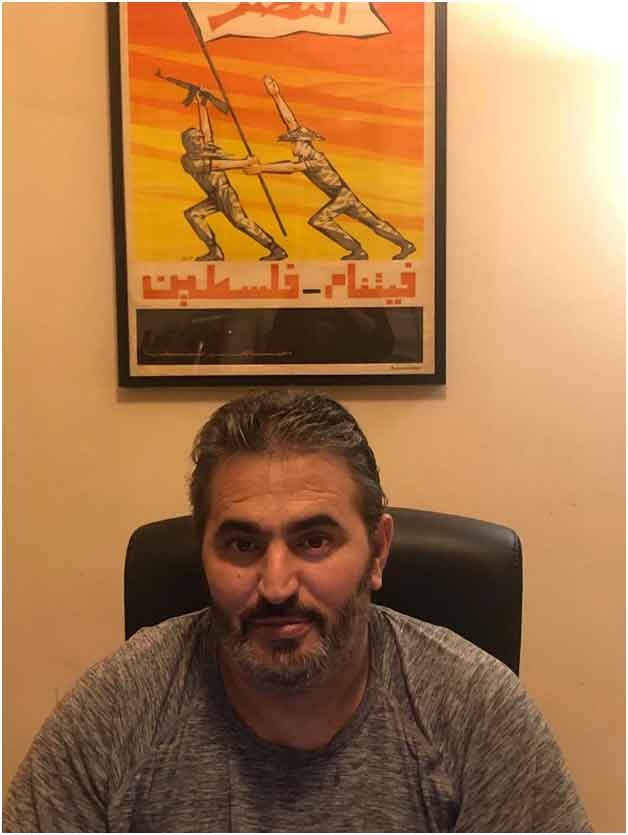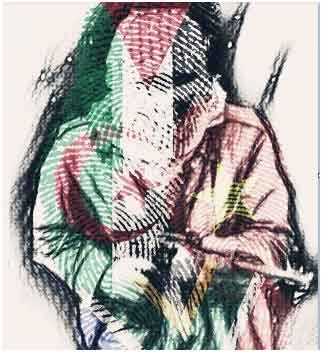Celebrating the path of resistance for the Palestinian people

Image: Poster behind writer and activist Khaled Barakat says: “Vietnam — Palestine.” [courtesy of Khaled Barakat]
In the interview below, Palestinian writer, researcher and activist Khaled Barakat, co-organizer of Masar Badil (The Alternative Palestinian Path Conference: Towards a new revolutionary commitment, Madrid, Spain, October-November 2021), says:
We are confident that the decisions, actions and plans of the conference will spread widely to the Palestinian people, the Arab nation and all of the friends and supporters of Palestine and the liberation movements of the world, through mobilization, joint action and common struggle. The conference is fundamentally a first step to build forward to make this alternative revolutionary path a reality.
And what a confident stride this revolutionary march towards Palestinian liberation seems to have despite the substantial obstacles arrayed against it. The grave challenges are, to my mind, akin to those faced by Neil Armstrong, who nevertheless was able to declare in 1969 when his left foot first touched the moon’s surface: “That’s one small step for man, one giant leap for mankind.”

Image: https://masarbadil.org (Conference of the Alternative Palestinian Path): Towards a new revolutionary commitment, Madrid, Spain, October-November 2021. The website of the conference is available in several languages.
I am planning to attend this conference in Madrid and will be blogging on how the decisions made there will translate into a commitment among activists of every stripe to building “a meaningful and substantial popular movement among the Palestinian people, in diaspora and exile as well as inside Palestine.” So, please stay tuned.
Following are Khaled Barakat’s answers to a few questions about Masar Badil I put to him:
- Rima Najjar (RN): I have the impression that preparations for the conference have been operating a bit under the radar in that very few people are aware of its activities and exciting potential for Palestine. How much of this is deliberate and how much is it the result of other factors?
Khaled Barakat (KB): The preparatory committee for the Masar Badil conference has been working for over a year to discuss and envision a revolutionary alternative path for Palestine. This year’s conference coincides with the 30th anniversary of the infamous Madrid conference, one of the most momentous steps toward Arab official normalization with Zionism and with a U.S.-dominated, so-called “peace process” that served to dismantle the Palestinian revolution and its structures of popular participation. On the 30th anniversary of the Madrid conference, we are working to bring together the grassroots organizers and leaders of Palestinian communities, especially those in exile and diaspora around the world, for conferences in Madrid and Beirut.
Of course, there are many institutional obstacles. This conference has received no institutional funding or official sponsorship from any party, so all participants are paying their own way to attend. The venues for the conference are being arranged by grassroots organizations in Madrid, working with community centers and popular institutions. What all of this means is that, like all elements of the Palestinian struggle, there will always be a challenge to break through the dominant voices, especially in English-language media, that push for yet more pointless negotiations and normalization and do not wish to see the Palestinian movement regain its revolutionary voice, vision and direction. We are confident that the decisions, actions and plans of the conference will spread widely to the Palestinian people, the Arab nation and all of the friends and supporters of Palestine and the liberation movements of the world, through mobilization, joint action and common struggle. The conference is fundamentally a first step to build forward to make this alternative revolutionary path a reality.
“Resistance is the choice of the Palestinian people, not normalization and capitulation to imperialism, Zionism and reactionary regimes that host U.S. military bases and sign deals with the Israeli occupation.”
- RN: As I see it, among many other things, this conference is a push to reflect on the world stage the true image of Palestinian resistance (as opposed to the image Israel’s hasbara and US complicity have long succeeded in imposing on western media). At a human level, this means the image of individual resistance leaders — in the student, feminist, labor or armed struggle movements (whether these individuals are imprisoned or martyred). Can you speak to that?
KB: One of the central aspects of this conference is celebrating and pushing forward the path of resistance for the Palestinian people, the clear alternative of the failed path of Madrid and Oslo. The Palestinian resistance and the Palestinian people and their friends everywhere around the world made it clear this May — if it was not already quite clear — that resistance is the choice of the Palestinian people, not normalization and capitulation to imperialism, Zionism and reactionary regimes that host U.S. military bases and sign deals with the Israeli occupation. One of the central focuses of the conference is supporting Palestinian prisoners, the representatives of the resistance inside Israeli prisons. Samidoun Palestinian Prisoner Solidarity Network is one of the organizations working to bring this conference together, aiming to highlight and build global solidarity for the prisoners, not only as victims of torture and human rights violations, but as leaders of the Palestinian resistance pointing a way forward for the Palestinian movement. This includes prisoners like Ahmad Sa’adat, Khitam Saafin, Mahmoud al-Ardah and the heroes of the Freedom Tunnel, and the thousands of men, women, children and elders imprisoned for their resistance to Israeli occupation. It also includes political prisoners like Georges Ibrahim Abdallah, jailed for 37 years in France because he will not abandon the path of resistance. By organizing, building and acting together, we can not only reclaim the image of these resistance leaders but also work to meaningfully obtain their liberation.
- RN: In what way is this conference a threat to the Palestinian Authority and Israel’s entrenched desire to hold on to the status quo?
KB: The Palestinian Authority is an outcome of the process of Madrid and Oslo. It exists in order to serve as a subcontractor for the Israeli occupation and to engage in security coordination to undermine the resistance, not to represent the Palestinian people. Therefore, Israel wants to preserve the PA in order to maximize the effectiveness of its colonial control. This conference reflects the political will of the Palestinian people for a popular movement that can organize the vast energies and profound commitment and dedication of the people in order to obtain our liberation. Palestinians in diaspora must no longer be cut off from the processes of decision-making and leadership in the revolution, alongside our sisters and brothers throughout occupied Palestine, from the river to the sea. This is the only way to a real national unity, based on resistance and not on positioning for control and power in the Authority, because that form of “power” is only illusionary. We believe that the Palestinian people and their resistance can and will achieve victory, and that we must organize in order to make that day sooner.
“Of course, the Zionist movement, right-wing forces and imperialists do not want to see the conference or, more importantly, its goals, succeed. These are the forces that brought about the Madrid conference and that disastrous path for the Palestinian people 30 years ago today.”
- RN: What kind of push-back to the goals and spirit of the conference are you envisioning?
KB: Of course, the Zionist movement, right-wing forces and imperialists do not want to see the conference or, more importantly, its goals, succeed. These are the forces that brought about the Madrid conference and that disastrous path for the Palestinian people 30 years ago today. We can expect the usual attacks, attempts at intimidation and suppression, and right-wing media smears. Our comrades in Spain organizing the conference have already seen this locally, with their activism smeared by Zionist forces, alongside the political parties and organizations they work with to build broad support for Palestine. We can also expect apologists for the Palestinian Authority and the Oslo path to oppose this alternative path for Palestine, because it does present a real alternative for our people away from this failed, destructive road. However, all of this is nothing new for any movement aiming to obtain the liberation of Palestine, and we are confident that such attempts will not succeed, because Palestine needs a new path forward, for liberation, from the river to the sea, and no amount of propaganda will lessen the commitment of our people to achieve that goal.
- RN: What, in your view, will it take to catapult this conference into the world stage and signal a commitment to real change, especially among activists who might be committed to a divergent “path” to Palestinian liberation.
KB: What it will take is following up on the commitments to action made at the conference. The conference’s decisions have yet to occur, so I cannot speak for them yet. However, it is clear that the conference will commit to building a meaningful and substantial popular movement among the Palestinian people, in diaspora and exile as well as inside Palestine. This means organizing hand in hand with our people in the refugee camps, building bridges with our sisters and brothers inside occupied Palestine, and building the unions of women, writers, students, workers, health professionals and others that are necessary to harness the tremendous vision and dedication of the Palestinian people and our comrades on the road to liberation. This is a Palestinian, Arab and international movement with a Palestinian, Arab and international view of liberation, committed not only to organizing and writing and to action. We invite all who share this vision and goal to join us in making that a reality.
__________________________
Rima Najjar is a Palestinian whose father’s side of the family comes from the forcibly depopulated village of Lifta on the western outskirts of Jerusalem and whose mother’s side of the family is from Ijzim, south of Haifa. She is an activist, researcher and retired professor of English literature, Al-Quds University, occupied West Bank.
Related posts:
Related posts:
Views: 0
 RSS Feed
RSS Feed

















 October 18th, 2021
October 18th, 2021  Awake Goy
Awake Goy  Posted in
Posted in  Tags:
Tags: 
















